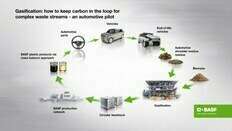- Pilot project recycles complex automotive waste into raw materials using gasification.
- Chemical recycling replaces fossil materials with circular automotive waste streams.
- Recycled materials used in steering wheel production, enhancing circular economy.
- Gasification technology converts mixed waste and biomass into synthetic crude oil.

Pilot Project Overview
BASF, Porsche, and BEST have completed a pilot project demonstrating the chemical recycling of complex waste from end-of-life vehicles. This process converts automotive shredder residues into raw materials for new vehicle components, such as steering wheel foam.
Innovative Recycling Process
The project marks the first instance of replacing fossil raw materials entirely with circular automotive waste streams through gasification. This method processes a mixture of plastic, film, paint, and foam residues, which are typically only thermally recycled, into new plastics.
Project Goals and Outcomes
The initiative aims to reduce reliance on primary materials and increase the use of recycled materials in vehicles. The chemically recycled materials were successfully used in manufacturing steering wheels, showcasing the potential for automotive shredder residues as a future recycling source.
Gasification Technology
BEST's gasification technology was employed to convert a combined waste stream of automotive waste and biomass into synthesis gas and its derivatives. This process replaces fossil raw materials in BASF's production network, contributing to the creation of new plastics.
Broader Implications
The project highlights the importance of complementary recycling technologies, such as chemical recycling, to achieve circular economy goals. BASF emphasizes the need for a broad spectrum of recycling solutions, including mechanical recycling, to effectively manage various waste streams and reduce landfill and incineration.

